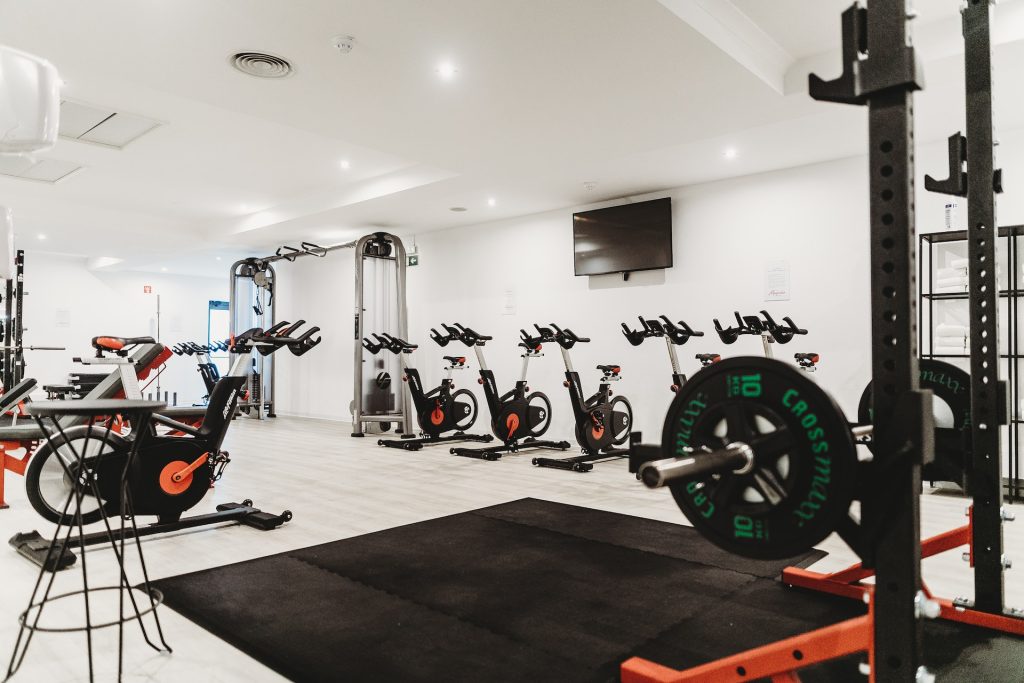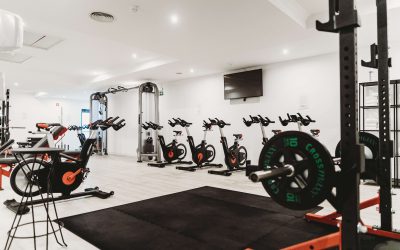The fitness industry is thriving, making it a potentially lucrative opportunity for investors looking to capitalise on the boom. 14% of people in the UK already have a gym membership, with 19% planning on joining a gym in the next year.
With 79% of people saying their health is more of a priority now than before the pandemic, now is a good time to explore starting a gym franchise, particularly if you already have an interest in fitness. This lets you explore your passion for improving the lives of others while also making a profit.
One of the key considerations in starting a gym franchise is deciding which type of gym to open. For example, some franchises have very high initial costs which might be offset by lower long-term utilities; the opposite may also be true, depending on the brand. In this article, we look at how to franchise a gym and the specific steps that you’ll need to account for when opening these facilities.
What you need to open a gym franchise in the UK

Healthy financial assets are the main prerequisite for owning a gym franchise, though the fees differ from one brand to the next due to a number of factors.
For example, Anytime Fitness gyms require a minimum investment of £170,000, while Snap Fitness requires at least £200,000 in capital. One reason is the business model. Snap Fitness offers more hands-on help to franchisees, providing more support across these costs; this may even reflect a greater level of brand prestige.
The location you choose can also affect this, as more affluent areas usually have much higher property ownership and rental prices.
There are other considerations that might increase your chances of success, especially as you need to convince the company that your leadership can help them add another profitable gym to their portfolio. They could even refuse your offer if they think your management style clashes with the gym’s ethos – the franchise is investing in your skills just as much as you’re investing in their gym franchise.
For example, Énergie Fitness regularly innovates upon their gym franchise business plan to match industry trends. They would naturally want owners who are passionate about these changes and who will enthusiastically enact them.
Step 1: Compare the pros and cons

If you want to know how to open a gym franchise in the UK, understanding the benefits and drawbacks helps you determine if this is the right move and lets you plan for possible challenges.
Here are some pros and cons of owning a fitness franchise:
Pro: Brand recognition
The franchise you choose inevitably has a pre-existing audience. For example, PureGym has 1.7 million members across the UK with many more potential members in untapped locations. As the UK’s largest private gym operator with 333 sites, this strong reputation and positive word of mouth would help position the brand well to new audiences.
In contrast, easyGym is a smaller competitor with just four locations throughout the country. However, while they might not have as strong a brand presence as a gym, they still belong to the renowned ‘easy’ family of brands that includes easyJet, and have a business model that aims to return your entire investment in less than 3 years. This could be enough for you to consider setting up an easyGym.
Con: High investment
Your initial investment varies significantly from one brand to the next. The biggest names in particular may ask for the highest fees – though this often means they can offer more help and cover more through the costs.
For example, Snap Fitness typically costs more than other brands with a £200,000 investment required, but provides more assistance in terms of finding a location and sourcing the equipment – many franchises do not cover this cost. GYMGUYZ, however, only requires a £25,000 initial investment because the company offers home-based personal training and so doesn’t require a gym space.
Pro: Greater profits
Many franchises promise a quick return on investment – with Énergie Fitness sites in particular usually turning a profit by their fourth month of operation. easyGym franchises break even within a month and can return the owner’s entire investment in under three years.
Operational costs could impact this – Hitsona sites in affluent areas, for example, have higher utilities and rent prices, affecting profitability as well as individual service fees.
Con: Strict guidelines
The brand owners have a final say in most gym decisions, so it’s important you align with your chosen franchise and its requirements. For example, Jetts is a 24-hour gym brand and would thus expect its owners to operate with this in mind. Énergie Fitness similarly changes its approach often to reflect changes throughout the sector, and franchise owners must accommodate these innovations, no matter their leadership style.
Pro: Consistent support
Some brands offer more help than others, which potentially turns hands-on management into a benefit. Hybrid Fitness provides a lot of assistance to prospective owners in terms of finding a location whilst also helping with legal matters, recruitment – as well as building the gym. Anytime Fitness boasts connections with leading bank partners to assist owners with financing; and offers access to over 30 fitness franchise business model experts.
Step 2: Choose a franchise
There are many leading franchises that you could partner with – including GYMGUYZ, Hitsona, Énergie Fitness, and more. Here are the main considerations you should consider when making this decision:
1. Start-up cost
Every gym is a significant investment, but the way they spread this cost could impact how viable each franchise is for your budget. For example, Snap Fitness asks for at least £200,000 in personal capital, which usually grows up to £550-750,000 for individual properties, though up to 60% of this could come from bank funding.
Hitsona, by contrast, offers facilities for as low as £20,000, though higher investments mean bigger properties – and greater chances of high profits. This flexibility is one of the major signs of a good gym franchise partner.
2. Local competition
People often go to whichever gym in their area offers a good balance of convenience and quality. If you have a clear location in mind, it helps to investigate which facilities are nearby and what customers could be missing.
For example, if the most popular local facility closes at 11pm, you might want to invest in a gym franchise such as Anytime Fitness which is open 24 hours a day. If your area isn’t already represented by a major name, such as Énergie Fitness or PureGym, you could fill this gap in the market with your franchise.
3. The customers
Your gym will only be as successful as the people who use it, which depends on local demographics. You might be in a location with a higher average age than most of the UK, and some franchises offer specialist services to cater to older members. Hitsona for example, offers bespoke exercise programs for older adults, which potentially makes it the best choice in this context. Similarly, locations with a lower average age can prefer a brand such as Énergie Fitness due to its commitment to innovating and evolving the gym experience.
Other franchises, such as Curves, target women specifically, while GYMGUYZ allows you to specialise in home personal training which can bring down the overheads of running a traditional gym and mean you offer a niche to customers looking for that service.
4. Personal preference
You can only serve as a good manager and spokesperson for your chosen franchise if you’re passionate about what it has to offer. This means investigating each option closely to determine if they suit your leadership style and approach to fitness. Owning a gym franchise means representing that brand.
For example, a Hitsona gym will engage with modern trends, including wearable technology and small group training sessions with the added benefit and a USP for their members and the exclusivity of patented HIT machines, used for high intensity, low impact, resistance training. You must be passionate about these additions to incorporate them into your gym, or you may be unable to lead the brand to success.
Step 3: Create a business plan
Your gym franchise business model depends upon a robust fitness franchise business plan to succeed, which is vital for convincing brand owners you can create a profitable franchise and that you understand their firm.
The main components of any gym business plan include:
• Local analysis
Your plan must have comprehensive information on the area and its demographics – including how you intend to leverage this. For example, an aging population would prefer exercise classes that cater to their needs. You could implement yoga or Pilates lessons, as well as other senior-based events, to attract these customers.
However, if you’re establishing your business in a lower-income area, then you might consider a franchise that is aimed at the value end of the industry with low fees and zero contracts, such as PureGym.
• Marketing plan
The brand will help you with promoting your franchise, but a specific exploration of how you intend to promote the gym across your local community shows your business acumen. This can include a social media campaign (especially when appealing to younger demographics) and special offers such as cheaper long-term memberships which are only available for the first few weeks of operation.
• Team Overview
Knowing the exact team structure you wish to use (or the one that the brand suggests) helps you recruit the best talent with more applicable skills. Some brands such as Hybrid Fitness can even take care of the hiring process independently. This lets you inform the brand about any specific skills or team members you need, such as personal trainers.
• Financial plan
This plan also details your gym’s projected long-term expenses and how this meshes with your chosen brand’s profitability metrics. You might even conduct market research into the services and classes you intend to run.
For example, the brand may not typically provide yoga classes – but you can prove this would be profitable for your franchise and appease its expected customers.
Step 4: Secure gym financing
Many franchise owners rely on outside help when accumulating the money to establish a new gym – and some brands even provide their own financial aid.
For example, Anytime Fitness can fund a significant amount of the gym’s overall costs through its own bank partnerships, and Snap Fitness expects up to 60% of the gym’s fees to come from banks.
Your own personal capital is still important as it represents your stake in the business, whilst also doubling as collateral. However, even this factor depends on the franchise. For example, Hitsona allows you to set up a branded gym for just £20,000, up to £50,000.
Your franchise can also offer equipment discounts or marketing pushes to boost the gym’s growth as they rely on your success to make a profit themselves. Snap Fitness provides its owners with significant help in sourcing equipment such as strength machines, ellipticals, cable machines, and more – which can otherwise be a major expense.
Hitsona is again a good choice in terms of equipment as the company offers patented technology which other gyms typically don’t have access to. For example, the specialized HIT machines allow users to burn 17% more calories while benefiting from an 80% reduction in post-exercise muscle pain.
If you require a bank loan to fund the gym franchise, external lending companies or your own local branch can help with this. Your chosen brand often advises you on the best routes for financing, but you can also take care of this independently. Your credit score and overall financial health are the most significant indicators of if you will successfully get a loan; you can improve your chances by applying for a smaller amount.
With this in mind, a cheaper franchise such as Hitsona (min £20,000 ) or Énergie Fitness (min £30,000) can be easier to secure funding for.
There are two main loan types that could help with this, specifically a Business Acquisition Loan or an Owner Financing Loan.
A Business Acquisition Loan is best when buying a pre-existing franchise – such as if a business creates the location before finding an owner.
Most transactions will instead use an Owner Financing Loan; this is the best option when establishing a franchise from scratch.
No matter which loan you choose, it’s important to be mindful of repayment terms. Assuming a successful launch, the profit that your franchise generates even after just a few weeks will help you with this.
Step 5 – Finalise the logistics
The fitness franchise business model includes a number of decisions that the franchisor could help with. When investigating how to start a gym franchise in the UK, here are the main choices you will have to make:
1. Location
Many gym-goers select a facility that’s conveniently located, though the reasoning behind this differs. Certain demographics, including the average age in the area, may be notable factors for what constitutes a ‘convenient’ location.
A Curves Fitness facility, which is specifically for women, located in a city centre or in an affluent residential area with a core family demographic could make good business sense by offering a niche close to your target audience.
2. Space
Depending on the number of competitors in your area, the number of members you expect to acquire from your target audience, and your plans for scaling up in the future, you will also need to determine whether to open a small, medium, or large box site. Each franchise offers different square footage, usually based on a predefined layout.
For instance, easyGym offers sites between 6,000 sqft and 16,000 sqft, while PureGym offers even more capacity up to 22,000 sqft because they have a bigger name and target a larger audience with low-cost memberships.
3. Machines and equipment
Your franchisor might provide you with machines – or they could use industry connections to secure them at a cheaper price. The company might even have custom equipment to address their specific business goals, which they will ask you to implement. For example, Hitsona utilises its patented HIT machines and their proven session afterburn affect and these machines are exclusive to the brand and they use their own wearable technology during HIIT sessions to test heart rates and show and record members session results.
4. Regulatory requirements
There are also several legal permits, documents, and trading regulations which are necessary before you open a gym. If you’ll need to build the facility from scratch, planning permission is important. Make sure that you register with your local authority’s health department if you plan to sell food.
You’ll also require PPL PRS and TV licences to play music or television during gym sessions. Employer’s liability and public liability insurance are also mandatory, and gyms will need to ensure staff are fully trained to the minimum standards and that they have a Health and Safety policy in place.
Many franchises discuss these requirements with you during the onboarding and negotiation process, ensuring you have the necessary support.
5. Recruiting qualified staff
Your gym will need a substantial staff to operate at its full potential once it opens. Again, you must purchase employer’s liability insurance and public liability insurance for complete coverage and ensure your staff has the relevant training and experience.
Some brands including Hybrid Fitness provide significant help during recruitment. 24-hour gyms such as Anytime Fitness will also naturally need more staff to best accommodate these hours.
Step 6: Open the gym
The actual process of launching the gym can help set you up for success, and much depends on how you set yourself apart from the rest of the market.
1. Marketing
Your initial marketing efforts in conjunction with the franchisor’s own nationwide branding and marketing strategies will be key to getting known about by your target audience. Some franchises offer recommended strategies for marketing, such as Hitsona which has a web-first approach. Digital marketing like this can keep costs low and allow you to target specific demographics and even postcode areas.
2. Promotions
The memberships you provide usually depend on the franchisor, but the low prices of PureGym and easyGym could be particularly tempting for new customers looking for a value offering. Franchise owners can also let you offer discounts for the first few weeks of operation, letting more people sample your services.
3. Timetable and services
Gyms also thrive by embracing specialist classes that fit a range of diverse activities.
For example, Hitsona runs high-intensity interval training (HIIT), bodyweight training, yoga, and other specific types of exercise with a focus on creating a real community both inside and outside the gym. Attendees may prefer personal training or a group environment – it helps to provide both so you can adequately cater to a range of preferences.
You might also engage directly with the local community to determine what they’re looking for as your gym develops, including preferred attendance times. Hitsona, in particular, puts a strong focus on community collaboration and how this could guide your franchise toward success.
Research found that gyms are busiest Monday to Wednesday, with Tuesday being the busiest day. The busiest times are usually 5 pm to 7 pm and 6 am to 7 am when many members visit before and after work.
However, if you operate in a community that is generally older, with a high retired demographic, then peak times might occur during other times of the day, and it might make sense to timetable classes around this.
4. Added value
Make sure your gym’s unique selling points and areas of added value are clearly positioned for new and potential customers. Hitsona’s heart rate monitoring, for example, offers users the ability to understand their body on a much deeper level and see how intense exercise stimulates the metabolism.
Anytime Fitness also has its own app for members, allowing them to continue their workouts at home and track their current progress. This can help motivate members in new ways, making it essential that you choose a brand that blends classic exercise techniques with modern technology.
Conclusion
Knowing how to buy a gym franchise and the exact steps to take after acquisition allows this purchase to reach its full potential. The company’s existing brand presence – combined with the work that you put in to reach your target audience – could result in significantly higher profits in comparison to setting up an independent fitness club.
While your franchisor typically has the final say in many decisions, the gym industry is flexible enough that you can enjoy a healthy degree of freedom. Owning a gym franchise can be highly rewarding, especially if you select a partner that fits your interests, aspirations, and management style.










